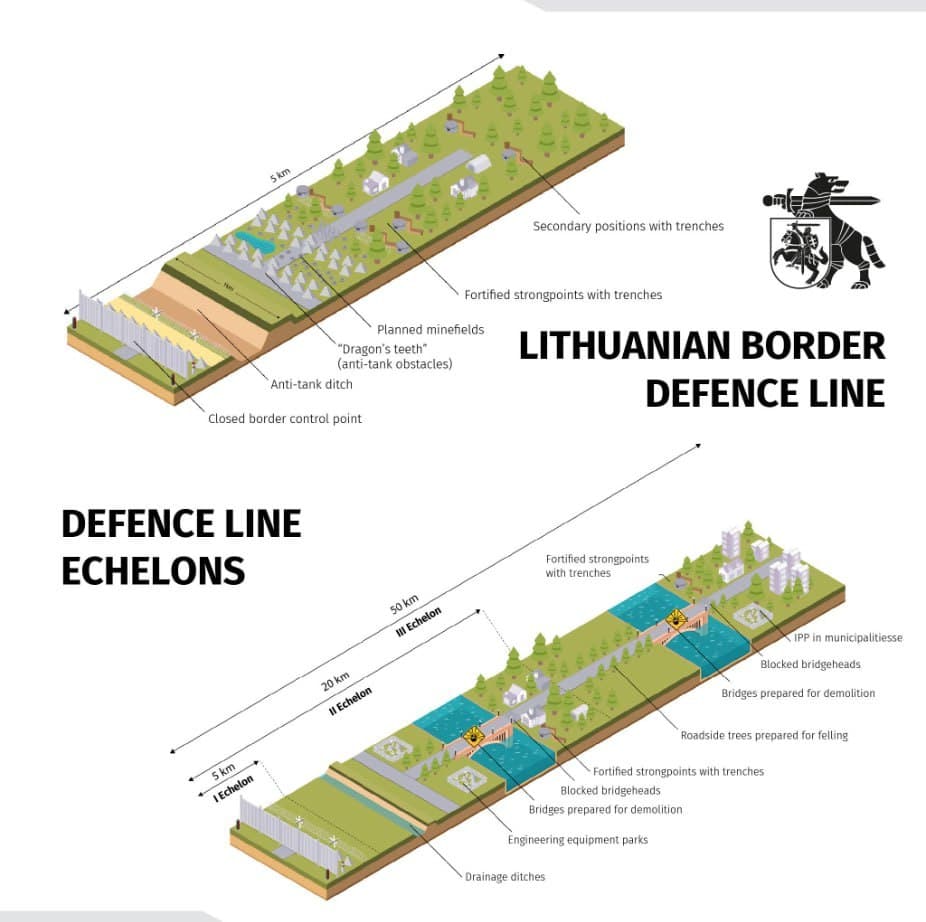Lithuania Strengthens Border Security with Comprehensive Defense Line Amid Rising Tensions
In a decisive move to enhance national security, Lithuania"s military has announced the establishment of a multi-layered defense line along its borders. This initiative comes in response to escalating geopolitical tensions in the region, particularly concerning the actions of neighboring Russia. The new fortifications will feature an array of defensive measures, including anti-tank obstacles, drainage ditches, minefields, and strategically prepared bridges for demolition. The Lithuanian government aims to bolster its defenses against potential incursions, reflecting a broader trend of military readiness among Baltic states.
Background & Context
The decision to fortify Lithuania"s borders is not occurring in a vacuum; it is part of a larger context of rising military activity and rhetoric in Eastern Europe. Following Russia"s annexation of Crimea in 2014 and its subsequent military maneuvers in the region, Baltic nations have been increasingly vigilant about their national security. Lithuania, which shares a border with Belarus and is in proximity to the Russian exclave of Kaliningrad, has felt particularly vulnerable to external threats. The recent buildup of Russian military forces near the borders has heightened these concerns, prompting Lithuania to take proactive measures to secure its territory.
In previous reports, Baltic states have expressed alarm over Russia’s military exercises and aggressive posturing, which they perceive as direct threats to their sovereignty. This multi-layered defense line represents a significant investment in military infrastructure, signaling Lithuania"s commitment to safeguarding its borders against potential aggressors.
Key Developments
According to the Lithuanian military, the newly constructed defense line will include various components designed to create a formidable barrier against potential invasions. Anti-tank obstacles will serve to deter armored vehicles, while drainage ditches will impede the movement of troops and equipment. Additionally, minefields are being established in key areas to complicate any incursion attempts.
“These fortifications are essential for our national security and reflect our determination to protect our sovereignty,” stated a military spokesperson during the announcement. The bridges prepared for demolition are particularly noteworthy, as they provide strategic options for controlling access points during a conflict. This layered approach aims to create a robust defensive posture, which will be crucial in any potential confrontation.
Broader Impact
The implications of Lithuania"s fortified defenses extend beyond its borders. As tensions rise, neighboring countries are likely to reassess their own military strategies. Poland, for example, has already increased its military presence along its eastern borders in light of perceived threats from Russia. This regional arms buildup could lead to an escalation of military readiness and potential confrontations, drawing in NATO allies into a more complex security landscape.
Moreover, the fortifications in Lithuania may inspire similar initiatives in other Eastern European nations, as they seek to enhance their defense capabilities. Experts argue that a collective response from Baltic and Eastern European states is essential to counterbalance Russian aggression. The situation echoes earlier instances in history where military posturing led to heightened tensions and conflict, raising concerns about a renewed arms race in the region.
What"s Next
Moving forward, Lithuania"s government plans to continue investing in its military capabilities, with an emphasis on modernization and strategic partnerships. Ongoing discussions with NATO allies are expected to focus on joint exercises and intelligence sharing to ensure a coordinated response to any threats. Furthermore, the Lithuanian military has expressed intentions to enhance its cyber defenses, recognizing the increasing importance of cybersecurity in modern warfare.
As the geopolitical landscape continues to shift, Lithuania"s proactive measures may serve as a template for other nations facing similar challenges. With the specter of conflict looming, the focus on border security will likely remain a priority for Lithuania and its allies, as they navigate the complexities of an unpredictable international environment.


![[Video] Heavy clashes and gunfire reported in Baghdad, Iraq](/_next/image?url=%2Fapi%2Fimage%2Fthumbnails%2Fthumbnail-1768342239932-848qsh-thumbnail.jpg&w=3840&q=75)




![[Video] Gunfire between Iraqi security forces and Sadr militias in Baghdad](/_next/image?url=%2Fapi%2Fimage%2Fthumbnails%2Fthumbnail-1768343508874-4redb-thumbnail.jpg&w=3840&q=75)
